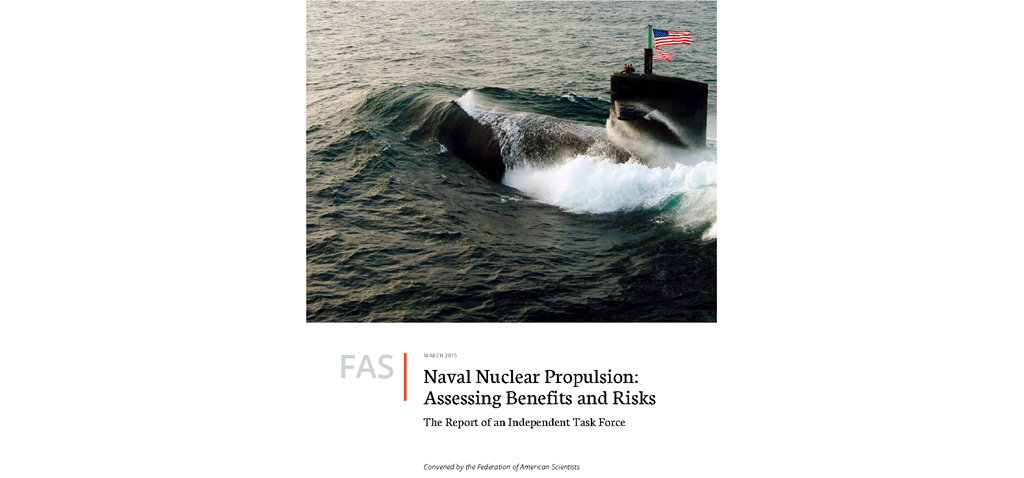
Naval Nuclear Propulsion: Assessing Benefits and Risks
The United States and other countries with nuclear navies have benefited from having nuclear-powered warships. But do the continued benefits depend on indefinite use of highly enriched uranium (HEU)—which can be made into nuclear weapons—as naval nuclear fuel? With budgetary constraints bearing down on the U.S. Department of Defense, the Naval Nuclear Propulsion Program is finding it difficult to address many competing needs including upgrading aging training facilities, handling spent nuclear fuel, and designing the next generation submarines to replace the Virginia-class attack submarines.
FAS convened an independent, nonpartisan task force of experts from the national security, nuclear engineering, nonproliferation and nuclear security fields to examine effective ways to monitor and safeguard HEU and LEU in the naval sector, and consider alternatives to HEU for naval propulsion so as to improve nuclear security and nonproliferation.
The results of the year-long task force study are compiled in the report, Naval Nuclear Propulsion: Assessing Benefits and Risks. The task force concluded that the U.S. Navy has strong incentives to maintain the continuing use of highly enriched uranium and would be reluctant, or even opposed, to shift to use of low enriched uranium unless the naval nuclear enterprise is fully funded and the Naval Nuclear Propulsion Program has adequate financial resources to try to develop a life-of-ship reactor fueled with LEU that would meet the Navy’s performance requirements. The task force endorses having the Obama administration and Congress allocate adequate funding for R&D on advanced LEU fuels no later than 2017 in time for development of the next generation nuclear attack submarine. “The United States should demonstrate leadership in working urgently to reduce the use in naval fuels of highly enriched uranium–that can power nuclear weapons–while addressing the national security needs of the nuclear navy to ensure that the navy can meet its performance requirements with lifetime reactors fueled with low enriched uranium,” said Dr. Charles D. Ferguson, Chair of the Independent Task Force and President of FAS.
Four companion papers written by task force members are also available:
- Investigation into the Unintended Consequences of Converting the U.S. Nuclear Naval Fleet from Highly Enriched Uranium (HEU) to Low Enriched Uranium (LEU) by Dr. Alireza Haghighat, Professor, Virginia Tech Transport Theory Group (VT3G), Nuclear Science and Engineering Laboratory (NSEL) Nuclear Engineering Program, Jack Bell, Graduate Research Assistant and Nathan Roskoff, Graduate Research Assistant.
- Phasing Out Highly Enriched Uranium Fuel in Naval Propulsion: Why It’s Necessary, and How to Achieve It by Dr. Alan J. Kuperman, Coordinator, Nuclear Proliferation Prevention Project and Associate Professor , LBJ School of Public Affairs, University of Texas at Austin.
- The UK Naval Nuclear Propulsion Programme and Highly Enriched Uranium by Dr. Nick Ritchie, University of York, UK.
- A Novel Framework for Safeguarding Naval Nuclear Material by Naomi Egel, Dr. Bethany L. Goldblum, & Erika Suzuki, University of California, Berkeley.
Naval Nuclear Propulsion: Assessing Benefits and Risks can be read and downloaded here (PDF).
The task force members thank the John D. and Catherine T. MacArthur Foundation for its generous support of this project.
The last remaining agreement limiting U.S. and Russian nuclear weapons has now expired. For the first time since 1972, there is no treaty-bound cap on strategic nuclear weapons.
The Pentagon’s new report provides additional context and useful perspectives on events in China that took place over the past year.
Successful NC3 modernization must do more than update hardware and software: it must integrate emerging technologies in ways that enhance resilience, ensure meaningful human control, and preserve strategic stability.
The FY2026 National Defense Authorization Act (NDAA) paints a picture of a Congress that is working to both protect and accelerate nuclear modernization programs while simultaneously lacking trust in the Pentagon and the Department of Energy to execute them.